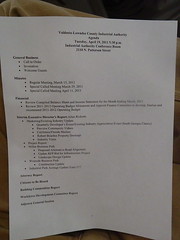In the
confidentiality agreeement
CCA and VLCIA signed way back on 17 August 2009,
I see nothing that says the Industrial Authority can’t talk about CCA
in general terms.
And I see a lot of things that a governmental entity by state law
can’t hide if the public requests them.
And that VLCIA has now revealed.
Which means the Industrial Authority has violated that agreement because
state law required it to.
So what does that say about the validity of other contracts VLCIA
has signed with CCA?
And what does it say about the practice of this governmental entity
signing confidentiality agreements?
That agreement includes this legal boilerplate:
 it will use any confidential, proprietary, or trade secret information to
which it has access solely for the purpose set forth herein and that it will
indefinitely protect the confidentiality of such information and will not
directly or indirectly disclose, reproduce, distribute, transmit or transfer
by any means in any form any confidential documents, information
and/or trade secrets that AUTHORITY may have or acquire during the
Evaluation Period.
it will use any confidential, proprietary, or trade secret information to
which it has access solely for the purpose set forth herein and that it will
indefinitely protect the confidentiality of such information and will not
directly or indirectly disclose, reproduce, distribute, transmit or transfer
by any means in any form any confidential documents, information
and/or trade secrets that AUTHORITY may have or acquire during the
Evaluation Period.
There’s nothing in there that says VLCIA can’t even say in their board
meetings that Project Excel is a private prison for CCA.
And outside board meetings, some board members have no reluctance to
acknowledge that.
Confidentiality agreements like that are normal between two business entities.
They seem a little odd between a business entity and a governmental agency.
For example, that Agreement continues:
For purposes of this Agreement, “confidential, proprietary, or trade
secret information” includes, but is not limited to, marketing materials,
conceptual site drawings and images, form contract agreements, the
identities of business contacts and the relationships developed with
such contacts during the Evaluation Period, proposed terms of purchase
and sale, if any….
Yet many of those things are by their nature public records that VLCIA
is required to hand over in response to an open records request,
such as the one Matt Flumerfelt made which produced documents such as these:
Continue reading → Work on Decatur County’s new agricultural office building is quickly progressing, with interior walls being put up and the installation of a roof soon to follow.
 Do we want a private prison in Lowndes County so more prisoners
can compete with local workers here, too?
If you don’t think so, remember
CCA says community opposition
can impede private prison site selection.
Here’s a
petition urging the Valdosta-Lowndes County Industrial Authority
to stop the CCA private prison.
Do we want a private prison in Lowndes County so more prisoners
can compete with local workers here, too?
If you don’t think so, remember
CCA says community opposition
can impede private prison site selection.
Here’s a
petition urging the Valdosta-Lowndes County Industrial Authority
to stop the CCA private prison.






